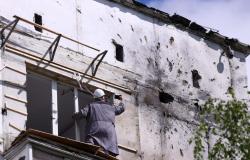Cécile Kohler and Jacques Paris have undergone inhuman detention in Iran since their arbitrary arrest in 2022. Their relatives denounce “destructive” conditions and growing despair.
For the past three years, two French citizens have grown in Iranian jails, victims of expeditious justice and prison conditions qualified as torture. Cécile Kohler, 40 -year -old teacher, and her companion Jacques Paris, septuagenarian, were arrested in May 2022 at the end of a tourist stay. Since then, they have been locked in the infamous section 209 of Evin prison, reserved for political prisoners.
The Iranian authorities accuse them of espionage, an allegation categorically rejected by France, which considers them as state hostages. Their detention, marked by confessions extorted under constraint and broadcast on national television, is similar to diplomatic blackmail. Their families describe unbearable living conditions: permanent light, prolonged isolation, rare outings and sporadic communications under surveillance.
-Cécile’s sister, Noémie Kohler, testifies to their growing despair. “They lose hope, exhausted by this endless expectation,” she says, evoking the repeated promises of an imminent verdict that never comes. Despite the sporadic releases of other European nationals in recent years, the couple remains prisoner, becoming the longest French detained in Iran.
France has announced its intention to seize international justice to denounce these blatant human rights violations. A symbolic decision, but which will not change their immediate fate. Relations between Paris and Tehran, already execrable, have further degraded with tensions around Iranian nuclear power and crossed arrests.
In the absence of diplomatic progress, families rely on citizen mobilization to maintain pressure. “We have to make noise, it is our only weapon,” insists Noémie Kohler, in contact with former prisoners like Benjamin Brière. Precious solidarity, but which is not enough to appease the anxiety of seeing their loved ones sink a little more every day in the forgetting of Iranian prisons.







